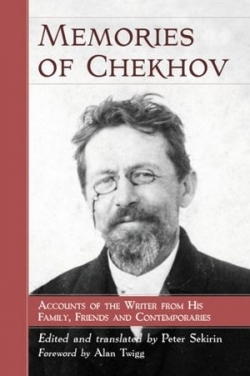Memories of Chekhov
Accounts of the Writer from His Family and Friends
“One can argue Anton Chekhov is the second most popular writer on the planet,” notes author and movie producer Alan Twigg in his foreword to Memories of Chekhov. “Only Shakespeare … outranks Chekhov in terms of the movie adaptations of their work.” Twigg cites the IMBD database as evidence and affirms Chekhov (1860-1904) as one of the most extraordinary writers of recent times.
Memories of Chekhov is not a literary review, however, or traditional biography; the book assumes the reader is familiar with the major events of Chekhov’s life and his work. This is a series of personal reflections told by those who knew him, translated and compiled by Peter Sekirin. More than one hundred contemporaries of Chekhov are represented, including family, friends, and literary colleagues. Most of these passages, many from obscure sources, have never before been translated into English.
This book will be useful to scholars and students of literature. Readers with a more casual interest may also find value, though the sometimes fragmented passages require patience. The book includes a helpful chronology of Chekhov’s life, as well as an annotated bibliography with essential details about the individuals cited.
These recollections are powerful not only for their breadth, but for their consistent insight into Chekhov’s character. Vastly different individuals from vastly different walks of life chose remarkably similar words to describe the man—warm, friendly, compassionate, quiet, and, above all, humble. Although readers may turn first to the pages citing Leo Tolstoy or Maxim Gorky, some of the most poignant insights come from those who met Chekhov only a few times.
Chekhov’s wry humor is clear in a story from Alexander Serebov-Tikhonov, a wealthy acquaintance who invited Chekhov on a fishing expedition. While baiting a hook, Chekhov noted fishing is “a sort of quiet insanity. You are happy with life, you are happy with yourself, and you are not a danger to anyone.” In another example, Chekhov handed a raw fish to a small dog, who devoured it in one bite, and said: “Look, that dog behaves exactly like our literary critics.”
Just days before Chekhov died of a long illness, he visited his brother-in-law, Vladimir Knipper-Nardov, who had separated from his first wife and was in “tremendous upheaval.” When Chekhov asked what happened, Knipper-Nardov replied with a joke. A few days later a postcard from Chekhov encouraged him: “Be more joyful.” Knipper-Nardov recalls, “I thought over his words for a long time, and was struck by the strength of his ability to express every detail of a person’s innermost emotional state.”
That ability to intuit deep emotions is part of what made Chekhov such a powerful writer, and it is a key reason for the continued resonance of his work today. But Sekirin provides little commentary. He leaves the reader to draw these conclusions, allowing Chekhov and his gentle, generous spirit to shine through these words written by those who knew him best.
Reviewed by
Kristen Rabe
Disclosure: This article is not an endorsement, but a review. The publisher of this book provided free copies of the book to have their book reviewed by a professional reviewer. No fee was paid by the publisher for this review. Foreword Reviews only recommends books that we love. Foreword Magazine, Inc. is disclosing this in accordance with the Federal Trade Commission’s 16 CFR, Part 255.

